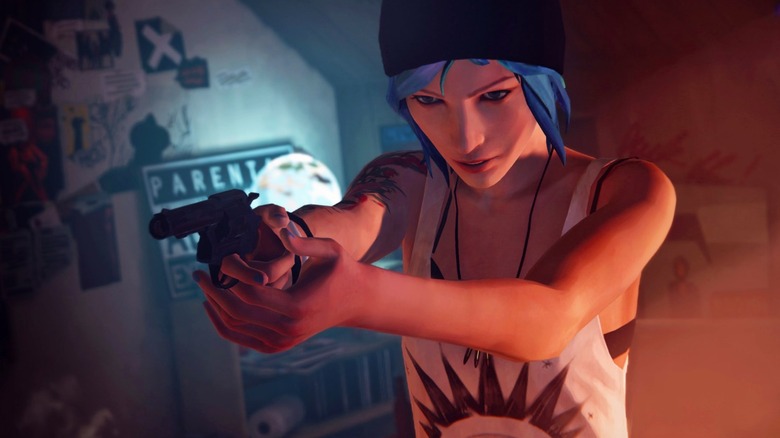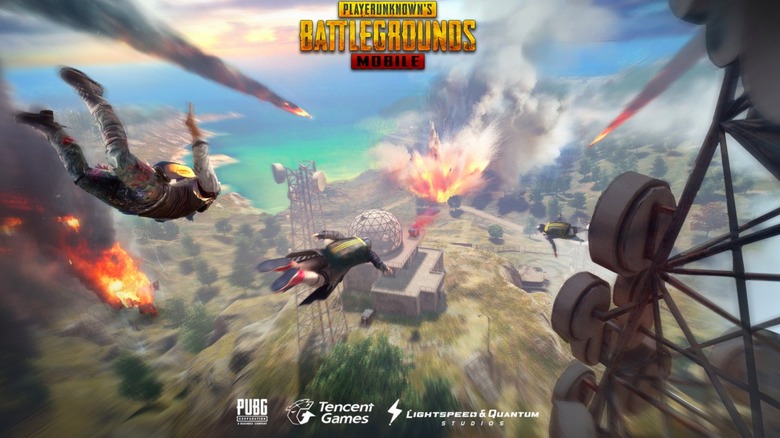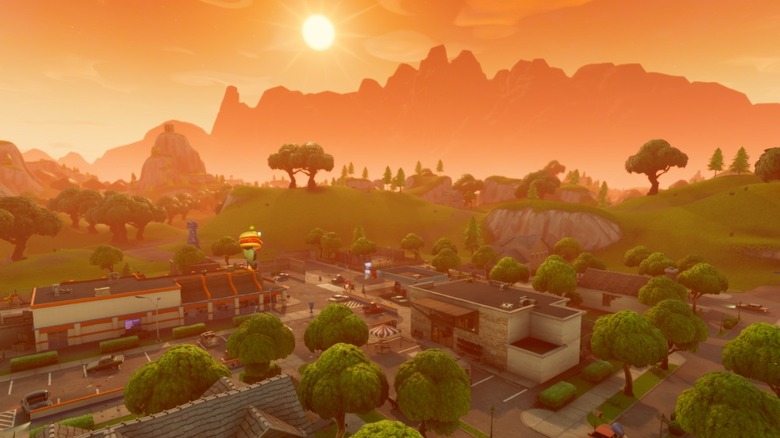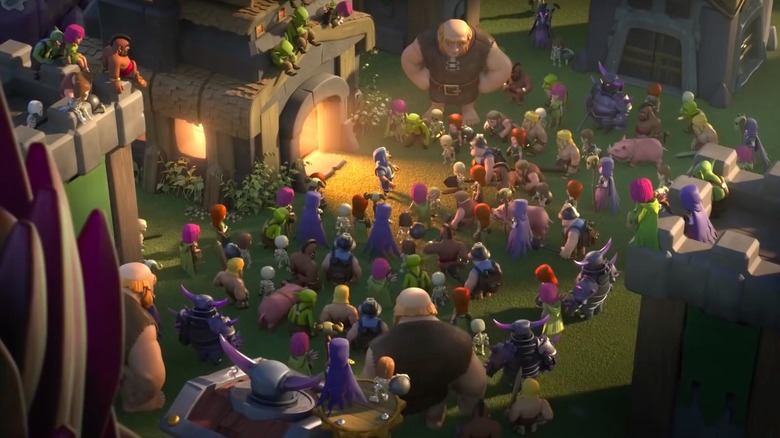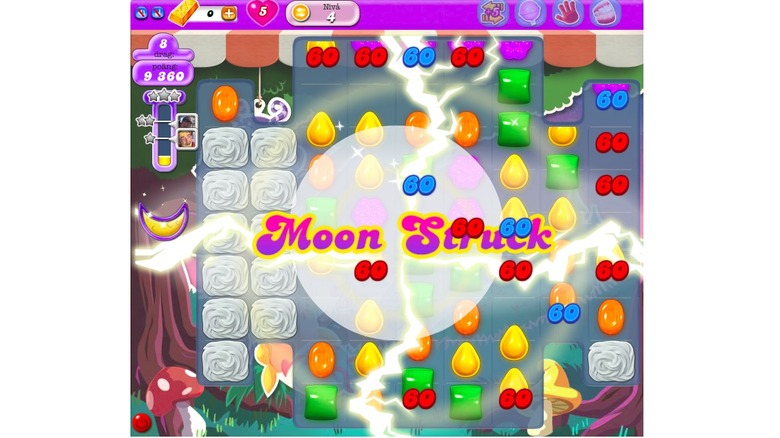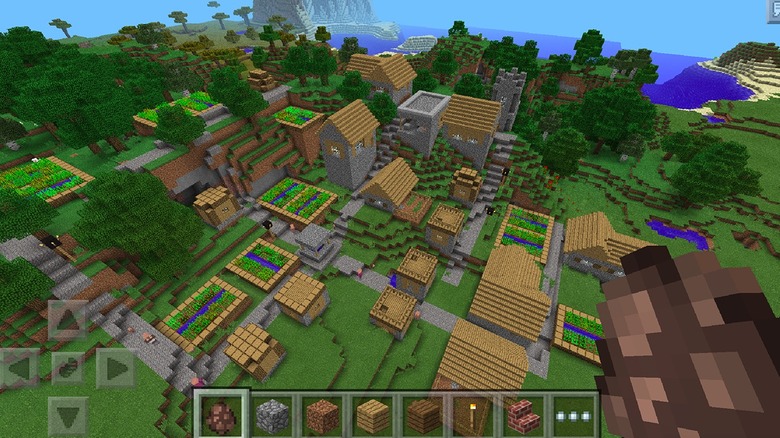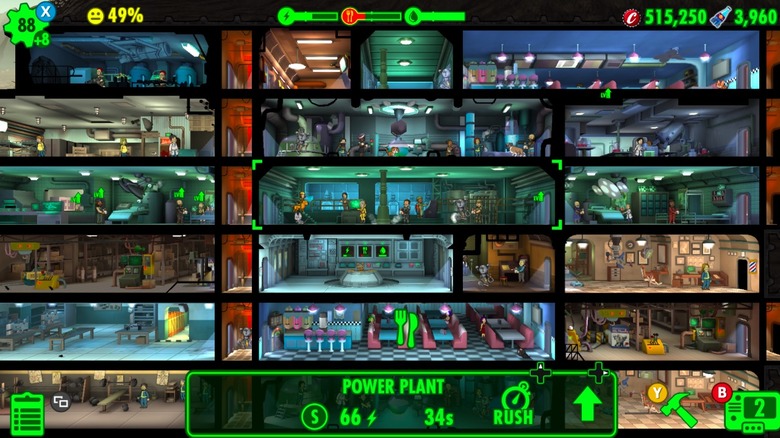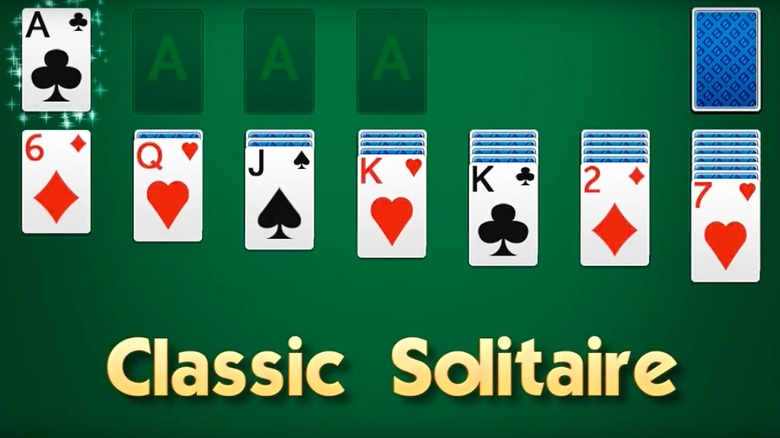The Worst Games For Your Mobile Phone's Battery Life
Gaming on the go isn't a new concept. Since the days of the Game Boy and the Tiger Electronics handheld games, gamers have been bringing their entertainment with them wherever they go. But with the invention of smartphones, games are more accessible than they've ever been. Even popular and relatively advanced games can be played on a smartphone. The caveat that comes with playing these involved games, however, is the toll it takes on your phone's battery.
Taking your entertainment with you while you travel can be both a blessing and a curse. The ability to stave off boredom on a long train commute or make a doctor's waiting room less mundane is fantastic. But when you get distracted and forget to check on the little battery icon on your phone, it can die before you know it, leaving you stranded with no way to use it for your more vital needs.
The choices seem to be, either bring a portable charger with you, or learn to avoid games that kill your battery in a record amount of time. If you decide to go with the latter, here are the games that will drain your phone's battery the most quickly.
PUBG Mobile
When it was announced that PlayerUnknown's Battlegrounds would be coming to smartphones around the world, the reaction was generally positive. Who didn't want to play their favorite battle royale game on the go? But with PUBG having more realistic graphics than some of its competitors like Fortnite and more labor-intensive elements like fog, players quickly began to wonder how this beloved game would fare on their phones.
Unfortunately for gamers everywhere, PUBG is one of the worst battery-sucking games found on mobile. In general, any 3D game is going to drain battery faster simply because of the intricate calculations your phone must make to achieve this three-dimensional plane. But in addition, games that link you to other players all over the world are going to monopolize your battery usage from the sheer effort it takes to keep a player connected.
While there are ways to stop PUBG Mobile from having any long term negative effects on your phone's battery, such as playing while your phone is plugged in to reduce battery depletion, there isn't much that can be done to keep the game from draining your battery while actively playing. If you're concerned about your battery, it may be best to sit this battle out.
Fortnite
Similar to the problems experienced by fans of PlayerUnknown's Battleground Mobile, Fortnite isn't much better on your phone's battery longevity. Because both Fortnite and PUBG are so similar, it makes sense that the two experience similar difficulties where battery is concerned. But the sheer popularity of Fortnite isn't doing much to help the problem.
In any given Fortnite match, it only takes moments to connect players to 99 other people, ready to battle to the death in a battle royale map. The fact that the Fortnite servers are having no problem coming up with 100 people to play together at any moment in time shows the vast popularity of the game. But this also means that, unless you're connected to WiFi on your smartphone, your data usage will go up in addition to the vast amounts of battery you'll be draining. The iOS graphics seem to be better for the Fortnite app than they are on the Android version, but this doesn't appear to make a difference in battery usage. The mobile app destroys battery on both mobile versions without any sense of discrimination.
In general, any game that requires your phone to construct a complex 3D world, keep you consistently connected with 99 other players, and integrate the numerous other functions that go into mobile gaming, is probably not going to be the most friendly to your battery.
The Sims Mobile
Mobile games have been improving dramatically over the years. Starting with the pixelated titles that were reminiscent of 8-bit arcade games to the intricate experiences we can find today, it's clear that these condensed versions of our favorite games are only going to continue to advance.
When The Sims Mobile was first announced, fans were understandably a bit skeptical that the game developers would effectively be able to take a game as expansive and detailed as The Sims and fit it into a nice, compressed, mobile package. It seemed like an undertaking that was simply too difficult. But players weren't disappointed by the impressive character creator and similar-to-console gameplay they were given in the game.
While many of the trademark aspects of The Sims were able to seamlessly transfer from console and PC to mobile, there was one glaring difference that couldn't be helped. With a game as intricate as The Sims, battery usage is bound to be astronomical. There's simply no way around that particular barrier. And while the idea of being able to take The Sims on the go is an appealing one in theory, the execution doesn't quite live up to the expectations. Because the game is such a drain on your phone's battery, the only way to appreciate long-term gameplay is to keep your phone plugged in. When you consider the restriction of being tethered to a wall outlet, it seems more logical to just stick to the console version.
Clash of Clans
When game developer Supercell released Clash of Clans on the iOS in 2012 and on Android in 2013, it became hugely successful. The strategy game, which started out strong as both a critical and commercial success, only continued to grow in popularity. In 2014, it was estimated that the game made $600K in daily revenue. Clash of Clans filled a space in the mobile gaming market that was previously uncontested, being cited as one of the major reasons strategy games grew in popularity on mobile devices.
With its immense success, familiar gameplay for any strategy genre enthusiast, and colorful graphics, Clash of Clans has seen many iterations and updates in its lifetime. While the current version of the game does seem to utilize less battery than its original version, the game still drains phone battery quickly. If players don't plan to play for long stretches of time, the app shouldn't prove too harmful. But any extended gameplay will take a severe toll on your mobile phone's battery, requiring numerous charging breaks to keep your phone from dying completely.
Candy Crush
Tile-matching puzzle games have been popular since the introduction of Tetris in 1984. Something about the repetitive and methodical act of finding ways for pieces to fit together and subsequently making room for more items has been oddly satisfying to gamers for decades. Not only is the gameplay easy to understand for seasoned and casual gamers alike, but the concept is reasonably universal and accessible around the world.
Taking the selling points of these tile-matching puzzle games and putting an aesthetically pleasing colorful twist on them, game developer King created arguably one of the most addicting mobile games of the day, the Candy Crush Saga. Spurring numerous expansions, spinoffs, copy cats, and reimaginings of the original vision from King, Candy Crush has brought in a whole new audience of non-gamers into the realm of mobile games. Because this game is relatively simple in design and execution, it's very possible that its infamous reputation as a battery draining parasite simply comes from the amount of time most people spend playing it. In fact, it's often noted as one of the top three mobile games responsible for heavy battery drain on smartphones. But when you look at studies showing how much time is often put into these addictive games, it becomes obvious where all of your phone's battery went.
Minecraft: Pocket Edition
Minecraft was a revolutionary game from its inception. Its quick ascent into the ranks of popular games and its ability to hold that position for such a long time just shows that the new approach to creative gaming was a sought after and previously unexplored avenue for game developers to pursue. The fact that it continues to hold the gaming community's interest proves its timelessness.
Because of Minecraft's simplistic game mechanics and easy gameplay, it was an ideal candidate to be turned into a mobile game. Unfortunately, though the gameplay itself translates well into the platform, your battery won't be spared by this crowd favorite. In fact, Minecraft: Pocket Edition actually uses 99% more battery than other similar apps. While this mobile building game is a great way to pass time while exploring your creativity, you might want to make sure that you're also exploring your surroundings for a power outlet. Otherwise your Minecraft adventure may be short-lived.
Pokemon Go
The summer of 2016 will forever be remembered as the summer that gamers around the world left their homes to experience nature and interact with one another IRL. The introduction of Pokemon Go offered a unique gaming experience that few games before it had presented. It was almost impossible to drive down a city street without seeing droves of gamers looking at their phone screens and attempting to catch every Pokemon they saw. And the game itself offered many unique and interesting ways to interact with the world around you. Of course, each of these unique opportunities were also opportunities for the game to mercilessly drain your battery.
Many of the aspects of Pokemon Go that made it appealing were also the things killing your smartphone's battery. Needing to keep your GPS active on your phone was only the tip of the iceberg with this battery-hungry mobile game. Turning on the camera to be able to see your Pokemon in the real world as if they were actually standing in front of you was not only a golden opportunity for some hilarious screenshots, but also a perfect storm for the untimely demise of your battery. Because Pokemon Go is a mobile game that's made to be played while out and about, simply playing the game while plugged into a wall outlet isn't exactly an option. Unless you have a portable charger with you, you probably won't be able to catch them all before your battery dies. Pokeballs never had this problem.
Life is Strange
When Life is Strange was originally released in 2015, it was met with positive feedback from gamers and critics alike. The dialogue-heavy gameplay where choices were presented to the player to change the past, present, and future set the tone for a well-written and clever narrative. The feeling that the choices in the game actually alter the path your character takes is one of the major draws of the game itself.
When it was announced in 2017 that Life is Strange would make its mobile debut, fans were excited to have the opportunity to take this deeply emotive story with them wherever they went. It quickly became obvious, however, that with the visually stunning cinematic cutscenes, and sheer size and depth of the game, that it wasn't going to be one that could be played for a long period of time without a portable charger or power outlet handy. While the game translated well from PC and console over to the mobile screen, the elaborate nature of the game proved too much for a typical cell phone battery. Though it may defeat the purpose of a mobile game, it may be best to have a reliable method of charging handy while playing Life is Strange.
Fallout Shelter
While awaiting the release of Bethesda's Fallout 4 in late 2015, a mobile Fallout game was released to satiate the eager masses. Fallout Shelter provided fans of the franchise with an opportunity to take part in their favorite post-apocalyptic world on the go. Because the game was free-to-play and came in the wake of news of the fourth installment in the series, it was an instant hit, garnering scores of downloads almost immediately.
The game proved to be an entertaining mobile adaptation of the original games, translating to the small screen perfectly. But just as with other relatively complex mobile games, it dries up your phone's resources faster than dwellers taking all the food in your vaults. Not only does the game take up quite a bit of space on your phone, but it also burns through your battery at an impressive rate. The long loading screens and ability to create an expansive vault system means that the app is utilizing much of your phone's battery just to keep the game running smoothly. Unlike the battle royale games on this list, battery isn't drained from the constant strain of being connected to other players around the world, but the world of the game itself is so involved that it, alone, is enough to drain your battery to zero in no time at all.
Solitaire
Solitaire is a game that's been around long before video games took center stage as the premier source of gaming entertainment. Numerous versions of this popular card game have been created on almost every platform imaginable and all versions utilize mostly identical mechanics. Because of its simplicity, not much has been done to change it over the years, save for a few aesthetic tweaks.
The actual game itself has stayed simplistic in design and execution, which is why it's a surprising contender on this list of battery sucking mobile games. But though it seems simple and harmless enough, Solitaire is actually a huge drain on your phone's battery. It uses 54% more battery than other card game apps and even though it's been around for a long time, developers are still trying to find the perfect way to shrink this game down to a handheld size, as the portrait view still gives them trouble. And even though they've had a long time to work on it, this small and simple app still seems to be an elusive battery hog, hiding under the facade of an old familiar go-to time waster for a slow day. Don't let the simplicity fool you into thinking your battery is safe from its draining powers. It'll still stealthily kill your battery dead before you notice.

